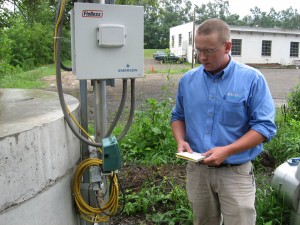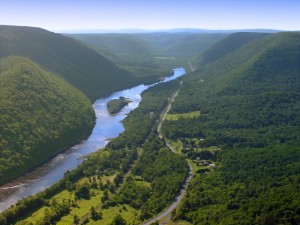SRBC Defends its Limited Role in Overseeing Water Quantity
-
Susan Phillips
When it comes to Marcellus Shale Gas development, the differences between the Delaware River Basin Commission and its central Pennsylvania counterpart, the Susquehanna River Basin Commission, are stark. The DRBC has been the force behind a drilling moratorium in Northeast Pennsylvania and southern New York. But the Susquehanna River Basin Commission has not weighed in on shale gas regulations, aside from monitoring water withdrawals.
For the past several years, environmentalists have put heavy pressure on the SRBC to change that. They argue that, like the DRBC, the SRBC should view its role as protecting water quality as well as quantity. These groups want the SRBC to do a cumulative environmental analysis of the impact of shale gas development on the river basin.
But the SRBC has rejected their pleas and is sticking with quantity. In a release issued Wednesday, SRBC executive director Paul Swartz argues that the multi-state agency lacks the expertise and the jurisdiction to conduct a more extensive environmental assessment of the impact of shale gas drilling on the watershed.
“When a regulatory agency chooses to stray out of its lane of expertise and mission,” wrote Swartz in a press release, “it can have profound programmatic and legal consequences. Most important, however, I believe it does the public a disservice.”
Swartz released the statement in conjunction with the agency’s recently launched study of cumulative water consumption, which he says is within the SRBC’s purview.

Andrew Maykuth / Philadelphia Inquirer/MCT/LANDOV
Susquehanna River Basin Commission inspector Andrew Orsborn checks a water pumping station meter to make sure nearby gas drillers are complying with water withdrawal restrictions during a drought in 2011. The SRBC has interpreted its role in the shale gas boom as strictly controlling water usage.
“Despite some calls for us to make it an expansive environmental assessment, we are being responsible water managers by focusing in our areas of responsibility and scientific and technical expertise,” said Swartz.
But Guy Alsentzer, with the Lower Susquehanna Riverkeeper, says Swartz is taking a “shortsighted” approach.
“When you see a large truck barreling down the road towards you,” says Alsentzer, “you change lanes.”
That truck, in Alsentzer’s mind, is shale gas.
“Not only does the SRBC have the ability to do [the environmental assessment], Alsentzer tells StateImpact, “we feel that they should be taking the onus and doing it.”
The SRBC is a multi-state compact created in 1972 between New York, Pennsylvania, Maryland and the federal government. And like the DRBC, it takes its marching orders from the signatory states. But Alsentzer says where the states of New York and Delaware have played a large role in determining how the DRBC manages shale gas drilling along the Delaware River, New York and Maryland have been pretty silent when it comes to drilling in the Susquehanna watershed.
“It’s a political battle of wills where Pennsylvania is leading the charge,” says Alsentzer. “It seems to me to be [New York and Maryland] turning a blind eye willfully on the part of one state that’s leading the other states down the path to [unknown environmental impacts.]”
Alsentzer says the SRBC’s current “Cumulative Water Use and Availability” study does not go far enough in assessing the impacts of such a new factor as shale development.
SRBC spokeswoman Susan Obleski says not only does the agency not have the expertise, it has not been granted the authority by the SRBC compact to do such an extensive study. That would require direction from the member states.
“We would only step in if one of our member states or the federal government failed to do so,” she says. “While the [SRBC] compact might mirror the old DRBC compact, we actually were instructed not to be duplicating and not to be exercising those authorities [vested in other agencies.]”
Those other agencies would be the Environmental Protection Agency and the Pennsylvania Department of Environmental Protection. Both the EPA, and the DEP’s predecessor the DER, existed when the SRBC was formed, but not when the DRBC compact was created, which could account for the different mandates.
“We are a creature of these agencies,” says Obleski. “And we fill in the gaps where they see the need.”
And that, she says, has always meant water withdrawal and flood controls.
Still, environmental groups like the Lower Susquehanna Riverkeeper say shale gas development presents new issues, and the SRBC needs to fill a gap left wide open by state regulators and the EPA.
“They have the power to do it,” says Guy Alsentzer, “but they aren’t inclined to do it.”
*Correction: A previous version of this story attributed a quote by Guy Alsentzer to Paul Swartz.

















